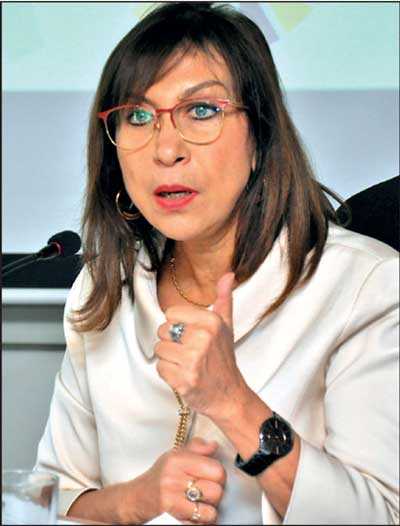Monday Feb 23, 2026
Monday Feb 23, 2026
Friday, 5 April 2019 00:00 - - {{hitsCtrl.values.hits}}
By Charumini de Silva
With the short-term outlook of Asia and the Pacific remains broadly stable, the UNESCAP ‘Economic and Social Survey of Asia and the Pacific 2019’ called on the region to prioritise ambitions beyond economic growth backed by bold policies putting people and planet first, raising concerns that inequalities in economies could present a challenge in achieving the Sustainable Development Goals (SDGs) by 2030.
 |
UN Resident Coordinator in Sri Lanka Hanaa Singer |
Releasing the survey 2019 by UNESCAP to the media yesterday, it highlighted that the rising inequalities of wealth, access to basic services, gender inequality and inequality to the ability to stand the setbacks and respond to the ravages caused by the climate change could result in an eroding social and economic progress, as well as on the minds and the social contract with the consequences for peace and stability.
“It is true that the Asia Pacific region is well poised, but with these trends we fear that it could present a challenge to most of the SDGs by 2030,” UN Resident Coordinator in Sri Lanka Hanaa Singer said addressing at the ‘Policy dialogue on the Economic and Social Survey of Asia and the Pacific 2019’ to coincide with the release of the survey organised by the Institute of Policy Studies of Sri Lanka (IPS).
The report suggest that to move towards a more harmonious path of development characterised by synergies rather than trade-offs, the region needs to urgently address investment shortfalls in people and planet. Survey 2019 estimates investment gap of $ 1.5 trillion per year or 5% of GDP for developing Asia Pacific. The report flags that investment gap varies significant across the region, rising to 16% of GDP in LDCs and 10 in South Asia. The survey also notes that this spending is within the reach of many countries given their fiscal space and potential to leverage private investment. However, it flags that rising financial instability, household debts, non-performing assets and trade wars can put growth at risk, which will further hurt poverty eradication programs.
She stressed that all the challenges of inequalities mentioned above were also relevant to Sri Lanka. “Despite Sri Lanka’s achievements in Human Development Index especially in health and education, the country still faces challenges in achieving gender equality, social protection targets, descent employment and environmental sustainability which is really challenging for all of us,” Singer stressed. She also called on the private sector to step in to fast-track the investment gaps to reach the Sustainable Development Goals (SDGs) in the region by 2030.
“We will not achieve the 2030 agenda without involving all sectors of the society. We all thought that reaching SDGs was only Government’s task, but it has to be a mobilisation to the community and for that the private sector needs to step in,” she added.
She said that they were in the process of commencing the communication campaign for the private sector to step in as it requires healthy relationship of all sectors of the economy.
According to Sri Lanka's 2016 estimate of the financing gaps in health, education, water and sanitation and social protection she said it has shown an annual deficit of Rs. 3.5 billion in achieving these targets by 2030.
“Efficient public spending alone is not sufficient to meet this deficit, everyone including the private sector needs to step up their efforts to close this funding gaps in order to achieve our common goals outlined in 2030 agenda,” Singer added.
Singer also noted that they were discussing with Government in prioritising processes with a formal framework that will also outline strategic timelines to achieve SDGs by 2030.
“We are in discussions with the Government as to how we can create a framework that can prioritise processes and financing processes as well as a strategic timeline to achieve the SDGs in 2030,” she said.
She emphasised that addressing these challenges requires a shift in the mind set and policy direction, which also means looking beyond economic growth. “It is a matter of urgency to empower women and girls to leverage on the immense potential of youth to positive change of innovations and to reverse the trend on inequality.”
Outlining three factors, she pointed out that it was critical for all economies to focus and accelerate on the implementation of the 2030 agenda in the Asia and the Pacific region, which is also applicable to Sri Lanka.
“Firstly, we need to break the silos of that constraints policy action across sectoral lines. The interconnected nature of the SDGs demand much greater policy synergy and coherence across economy, environment and social pillars of sustainable development. Secondly, we need to match intentions with finances, both public and private. There is a growing private interest in the SDG financing and proliferation of impact investment in the country. Thirdly, we need to scale up partnership to a level that we have never witnessed before,” Singer stressed.
“We need greater efforts towards empowering those left behind, which includes closing the gender gap, pursuing measures for groups with special needs and reaching those left out using universal policies and social protection interventions.”
Noting that the UN’s ongoing reforms are also about making the organisation more effective, coordinated, coherent, accountable and transparent to better assist countries to achieve 2030 SDGs, Singer reaffirmed that UN in partnership with the Government, development partners, civil societies, private sector and research institutes will remain committed to focus on realign in achieving peaceful, inclusive and equitable development for the people of Sri Lanka with a special focus on ‘leaving no one behind’.
Pic by Lasantha Kumara